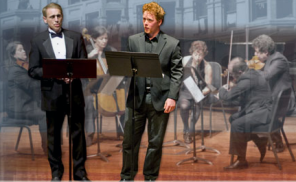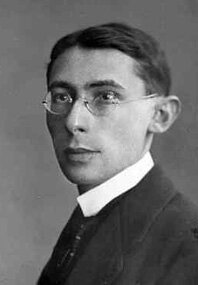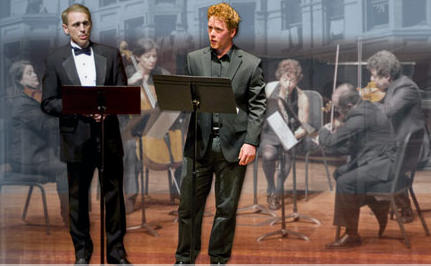
We are now starting the fourteenth season since Music of Remembrance began its odyssey, of telling the tale of the Holocaust from the aspect of the creative art nurtured within its horrors.
Its indefatigable founder and artistic director, Mina Miller, has every year unearthed more highlights, sidelights, spotlights, and gems of music and poetry pertaining to life in the concentration camps, ones that most of us would never have known about were it not for her work.
Each year Music of Remembrance offers two concerts at Benaroya Hall’s Nordstrom Recital Hall, one around the time of Kristallnacht, the Night of Broken Glass, which took place November 9, 1938, when Nazi thugs roamed Germany destroying anything and everything Jewish they could find. The other concert takes place in May and next year commemorates Holocaust Remembrance Day with a new opera by Jake Heggie.

Monday’s concert, like so many others in this series, brought a largely unknown aspect of the Holocaust to our attention, with a satiric revue, What a Life! by composer Hans Gál, composed and performed when he was in an internment camp on the Isle of Man off the coast of Wales in the United Kingdom.
Like many others, I never knew until recently that the British interned anyone they thought might be supporting German aspirations, and since they couldn’t tell who was bona fide and who was an infiltrator among the thousands of Jewish refugees pouring into the country, they interned them all until they had checked them out. Families were broken up, communication was poor. Families already refugees were subjected to even more stress.
Like the Japanese internment camps in this country and opened for the same reason, they are a blot on the country’s history. (I am English. Yes, England was on her knees in 1940, and many of my family died along with so many others, but it still seems shameful to me that we should have interned any Jews.)
Hans Gál, however, bore the British no lasting ill will, and unlike so many of his countrymen, lived a long and fruitful life in that country until his death in 1987.
His cabaret revue comprises a series of songs of camp life sung here by baritone Erich Parce and tenor Ross Hauck to words by Schubert scholar and fellow-internee Otto Erich Deutsch, with a small orchestra of piano, four strings, and two winds. Originally there was a theatrical script between numbers written by another internee, film director Georg Hoellering. This has been lost, and a new narrative taken from Gál’s diary which he kept meticulously.
What’s astounding is Gál’s and Deutsch’s upbeat attitude. The songs are irreverent, ironic, rueful, and funny as they skewer camp life. As well as singing, Parce gave it a light staging, so that a six-foot stretch of wire with barbs appears for the “Barbed Wire Song” (“Why are human beings behind wire?”), and a folding single bed arrives for the two singers in “Song of the Double Bed” with humorous consequences on stage (though they probably weren’t at the time). From the diary excerpts, read by actor Kurt Beattie, we find that the row of beachside hotels commandeered for the camp housed 72 inmates per house.
Gál was only in the camp about 19 weeks, but this clever, amusing, and truthful revue with its charming music hits home. In addition to the two singers, Jesse Parce acts as a battlebloused camp guard, with an unnerving toothbrush moustache.
Earlier in the program flutist Zartouhi Dombourian-Eby, and violinists Elisa Barston and Mikhail Shmidt performed Gál’s four-movement Huyton Suite, written while he was in transit camp near Liverpool in 1940. His own words say it best: “Here I am, writing…ridiculous, fantastic music…while the world…is coming to an end.”
True. The Suite, written for the only instruments available to him, is perky, and amusing, optimistic, lively, with the flute mimicking the camp bugle, a well-written piece we might easily hear on Seattle Chamber Music Society’s programming.
The program began with Vilem Tausky’s beautiful 13-minute Coventry: Meditation for String Quartet from 1941. Better known as a conductor, Tausky wrote this quartet while a member of the Czech Army in Exile and helping to search for survivors after the big Nazi air raid on Coventry. The first impression is that it conjures up the same mood as Barber’s Adagio for Strings. There is a sadness which pervades it, and part which seems a protest. The viola, played by Susan Gulkis Assadi, leads the melody, and the whole ends with a chord resolving into the major, perhaps an acceptance.
The fourth work on the program, Marcel Tyberg’s Piano Trio in F major, is a comedown musically from the quality of the other works. It’s a palm-court, salon-style piece, lush, a bit pretentious, schmaltzy, well-constructed but old-fashioned for its date, 1936.
Other musicians for the program included violinist Leonid Keylin, cellists Mara Finkelstein and Walter Gray, and pianists Craig Sheppard and Mina Miller.
